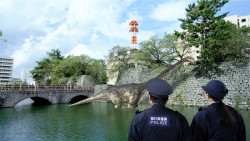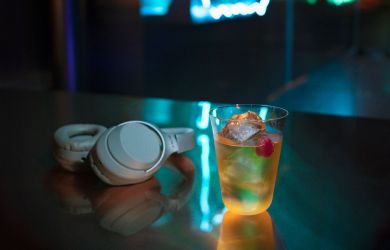
December 11, 2008
Annus Scandalous
A year’s worth of food safety scandals has upset Japan’s applecart
By Metropolis
Originally published on metropolis.co.jp on December 2008

Each December, the chief priest of Kyoto’s historic Kiyomizu temple unveils the single kanji voted by the public as best representing the past year. While the temple’s name metans “clear water,” the character selected for 2007 was far from pure: nise, meaning fake, was chosen after a series of food-mislabeling scandals stuck in the nation’s craw and damaged the reputations of some of the country’s best-known food companies.
Although this year’s kanji will likely reflect the freefall in the world’s financial markets, a deluge of new food safety scandals has shaken consumer confidence more than a James Bond martini. No deaths have yet been reported in Japan, but the public is increasingly concerned about what they put in their mouths—especially food imported from China, a country with which Japan has a famously fractious relationship.
But is it all a storm in a teacup, or is there more brewing under the surface? In interviews with consumers, retailers, restaurant owners and food importers, a multifaceted picture emerged of how the scandals have made 2008 a stomach-turning year for Japanese consumers.
“I’m worried about the food I buy these days, especially food that comes from China,” says Hiroko Saijo, a 45-year-old part-time worker from Yokohama. “I check carefully to see where everything comes from and avoid foods that I’m not sure about.”
Saijo is not alone. A government survey in September found that 89 percent of Japanese consumers would pick domestically produced products over imported foods. The Yomiuri Shimbun reported in February that since the Chinese gyoza scandal broke the previous month (see timeline), increasing numbers of people stopped buying frozen dumplings and began making their own with fresh domestic ingredients. According to the agriculture ministry, imports of vegetables from China dropped nearly 40 percent year-on-year in the first three weeks of February. And that was a full six months before the industrial chemical melamine killed or sickened thousands of Chinese children.
Supermarkets have certainly noticed this shift in consumer behavior. “The scandals have led to more people avoiding delicatessen or processed foods and buying proper ingredients to cook at home,” says Kazuya Suzuki, a spokesman for the Peacock chain of grocery stores. “Whenever a scandal hits, sales of similar products drop. Sales of frozen foods fell by nearly half in some stores following the gyoza scandal.”
Restaurateurs are another group struggling to convince customers of food safety—a task made harder if you’re a Chinese manager of a Chinese restaurant. Etsuro Den, manager of Tom’s Seimen on a Shimokitazawa backstreet, takes a proactive approach to dispel diners’ fears.
“Every time new customers come in, I tell them that we only use fresh ingredients, nothing frozen,” says the Beijing native. “Once they taste the food, they come back.” Den adds that Chinese food is always cooked through, unlike Japanese dishes such as sashimi. And he notes that the scandals have played out very differently in his homeland.
“I sometimes read the Chinese papers, and they take the opposite stance to the Japanese media,” he says. For example, according to Chinese news reports, the gyoza at the center of the January scandal became tainted in transit or after they reached Japan.
The local media’s role has certainly not cut the mustard with “John,” a Tokyo-based New Zealander who runs a company importing seafood and vegetables (and who requested his real name not appear in this article). After the June issue of business magazine Diamond ran an in-depth review listing all retailers, restaurant chains and food processors that source foods from China, John’s company, which was listed, experienced a sudden halt in orders. His business was hit further when a substandard batch of frozen spinach was discovered at customs in Kobe. Although John dealt in completely different products—ones that had been certified as safe by Japanese import authorities—a large supermarket chain canceled a major contract. John says that his business is now toast, struggling on importing small volumes from countries such as Australia, New Zealand and the US.
The panic that these incidents have touched off may be due to the fact that Japanese are more conscious of food safety risks than people in other countries. So says Luke Nottage, an associate professor of law at Sydney University and contributor to the East Asia Forum blog.
“When we know very little about the odds [of a situation], we tend to underestimate them, so even Japan ignores some food safety risks,” he says. “But once we know more about their odds, even if small, we tend instead to overestimate them, so Japan perhaps overreports and overreacts now to things like melamine.”
Overreaction or no, there are certain steps consumers can take to safeguard themselves. A spokesman for the health ministry told Metropolis that “consumers should check food doesn’t smell or taste strange, check the label and contact the manufacturer if they are concerned.” Careful not to point the finger at China, the spokesman says that “manufacturers and suppliers of all foods, regardless of where they are produced, are subject to the food hygiene law.”
But John takes the assurances of supermarkets, restaurant owners and the government with a pinch of salt. “Chinese food producers involved in exports of vegetables are dedicated and responsible, with world-class factories—in many instances, far more advanced and cleaner than food processing premises in Japan,” he says.
Neither does he mince his words about the media and rapacious company bosses. “When it comes to Chinese food products, the media make no attempt to differentiate between specific processors and importers and instead focus on the country of origin,” he says. “There are many unscrupulous Japanese importers motivated by short-term profit potential who pay no attention to processing standards or agricultural chemical applications. The scandals are issues of criminal intent and are not related to the genuine efforts of responsible importers, retailers and processors.”

- Stay informed of food safety issues by keeping an eye on the news and browsing watchdog websites
- Buy organic (look for the JAS symbol) and/or shop for produce that’s been grown domestically (known as kokusan: 国内産 or 国産)
- Beware of sell-by dates and grab packages from the back for fresher refrigerated stock
The International Federation of Organic Agricultural Movements (www.ifoam.org), or IFOAM, is a third-party certification board that acts as a worldwide umbrella organization. JONA, the Japan Organic and Natural Foods Association (www.jona-japan.org), is Japan’s independent non-governmental certification body, and a member of IFOAM. All products certified as organic under JONA regulations conform to both JAS and IFOAM standards.
The Japanese media loves its food scandals, so the government has stepped up work to prevent future fodder for the news crews. Here are some resources to help put you at ease.
Japan’s Food Safety Commission runs a website (www.fsc.go.jp) with the latest alerts (in Japanese), as well as an English section discussing topics like BSE, mercury and genetically modified food.
Those worried about what they’re eating can hang out in the Consumer’s Room (www.maff.go.jp/j/heya), a Japanese-language site provided by the Ministry of Agriculture, Forestry and Fisheries. The agency also has an English page (www.maff.go.jp/e).
Not to be left out, the Ministry of Health, Labor & Welfare maintains an informative food safety notice board in English (www.mhlw.go.jp/english/topics/foodsafety).








